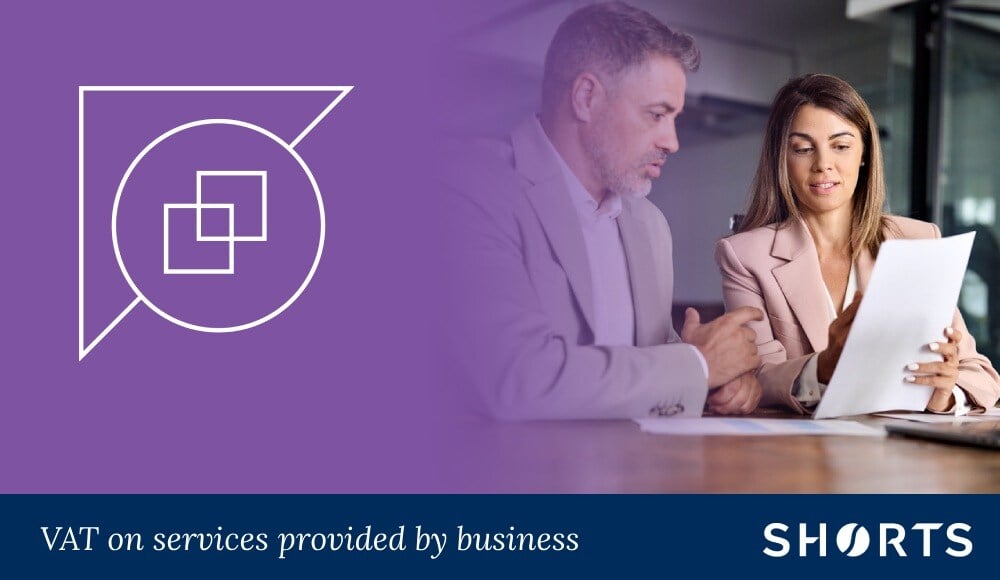
A VAT-registered business must charge VAT on their taxable supplies, which they remit to HMRC through periodic VAT returns. Taxable supplies include both goods and services.
Technically speaking, ‘supply of goods’ refers to the transfer of tangible items, while ‘supply of services’ refers to any transaction that is not a supply of goods.
Technically speaking, ‘supply of goods’ refers to the transfer of tangible items, whilst ‘supply of services’ refers to any transaction that is not a supply of goods.’
Therefore, UK VAT on services applies to various transactions, including:
- Services performed within the UK
- Services provided to customers outside the UK
- Services received from suppliers that are outside the UK
VAT when services are given away for free
Services provided free of charge are free from VAT. This is different to free supplies of goods on which VAT must be accounted for on the notional value.
Not accounting for VAT on free services, does not necessarily mean that goods or services purchased in connection with these services cannot be reclaimed as input tax. However, we recommend you take professional advice before reclaiming.
VAT and continuous supplies of services
A continuous supply of services occurs when services are provided regularly throughout an extended period of time and invoiced periodically. For example, rent and accountancy services.
When the consideration is determined from time to time, the service is treated as separately supplied on whichever is earlier of:
- the date the supplier receives payment, or
- the date when a VAT invoice is issued.
However, if a payment request is issued first and followed by a VAT invoice after payment is received, the supplier is not required to account for VAT until the payment is received.
Where an invoice is issued at the start of a period not exceeding one year, the services are treated as supplied on whichever is earliest of:
- the date the supplier receives payment, or
- the date the payment becomes due.
VAT and services to non-UK customers
Understanding the place of supply rules is essential when providing services to customers outside the UK or receiving services from suppliers located outside the UK. These rules determine where the supply of services is deemed to occur for VAT purposes.
In the UK, the place of supply of services is determined by “general” and “special” rules. If the place of supply is deemed to be outside the UK after applying these rules, then no UK VAT is chargeable.
The general rule
- B2C (Business-to-Consumer): The place of supply for B2C services is where the supplier belongs, regardless of the customer’s location.
- B2B (Business-to-Business): For B2B services, the place of supply is where the customer belongs.
Special rules
Certain services fall under special rules as outlined in the VAT legislation. These include:
- Services related to land
- The use and enjoyment of digital services
- Hiring transportation
- Restaurant and catering services
To apply the place of supply rule correctly, the specific nature of the service must first be considered against the special rules. If no special rule applies, the general rule is then used to determine the place of supply.
Where UK-business receive services from non-UK businesses
The reverse charge rules apply when:
- the place of supply is the UK
- the customer belongs in the UK
- the supplier belongs outside the UK
- the supply is not VAT-exempt, and
- you are VAT registered.
Generally, the reverse charge rule applies where UK businesses receive services from non-UK businesses.
Where reverse charge applies, the customer must act as both the supplier and the recipient of the service. This means that output VAT must be calculated on the full value of the goods received and included as output tax on the VAT return.
At the same time, the customer will also get relief for any input VAT they are entitled to in accordance with the normal rules. Where a business charges VAT on all its supplies, the VAT accounted for on services received from non-UK suppliers is the same as the VAT reclaimed on these services,
Establishing the VAT treatment of services can be complicated especially when services are provided to customers outside the UK or purchased from businesses outside the UK .We would always advise seeking specialist advice if you provide services to overseas customers or purchase services from overseas suppliers.

Paschal Okonkwo
I work as a tax advisor at Shorts, helping companies and individuals stay tax compliant in the UK.
View my articlesTags: VAT
